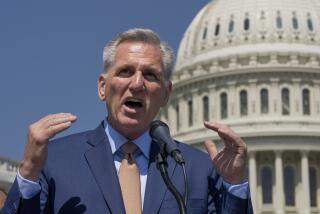Latest Surge in Japan Rates Dims Recovery Hopes
- Share via
TOKYO — The strains caused by Japan’s enormous government spending spree sent interest rates sharply higher and stocks reeling Tuesday, further undermining prospects for a turnaround in the world’s second-largest economy.
Japan’s bellwether 10-year government bond saw its biggest one-day price decline ever, sending its annualized yield to 1.94% from 1.5% Monday, after the Ministry of Finance’s trust fund said it would quit buying bonds--leaving few takers in sight.
The threat of still-higher interest rates, though discounted by some analysts, fueled a stock market sell-off, driving the Nikkei-225 index down 373.50 points, or 2.6%, to 13,779.45, a seven-week low.
“A lot of people are selling Japan because they think higher interest rates could cripple the economy,” said Andrew Shipley, economist at Schroders Japan Ltd.
Japan has run up huge deficits trying to revive its beleaguered economy and those of its troubled neighbors. However, investors have found themselves hard-pressed to digest the volume of bonds used to fund tax cuts, public works and economic stimulus packages.
This fiscal year alone, new government debt issuance will double to $269.6 billion. Put another way, every Japanese man, woman and child would have to ante up $1.9 million by March 2000 to pay off Japan’s outstanding obligations--a huge burden for present and future generations.
While markets have felt the pinch, the government made matters worse Tuesday by suggesting it no longer has much appetite for its own bonds. This helped send interest rates higher and undercut investor confidence.
Traditionally, the Japanese government, in various accounts, has been the biggest buyer of government bonds, taking as much as 70% of new issues. Many of those bonds are held by the Ministry of Finance’s Trust Fund Bureau, which invests for public pension funds.
On Tuesday, however, the bureau said it will stop buying bonds after Jan. 1, even as Finance Minister Kiichi Miyazawa and central bank Gov. Masaru Hiyami downplayed the market’s concern that the planned large new bond supply will strain credit markets.
The bureau can’t take much more, said Shinichiro Kawasaki, analyst with Daiichi Life Research Institute. “MOF simply can’t keep buying government bonds,” he said. “That’s all there is to it.”
Another big group of government bond buyers, Japanese life insurance companies and commercial banks, is already holding huge amounts and could also balk at further purchases, said Tetsuro Sugiura, chief economist with Fuji Research Institute.
Beyond the immediate demand-supply imbalance is a broader danger that higher sustained interest rates will damage Japan’s economy further. The yield on 10-year government bonds has more than doubled, to 1.9% this week from 0.7% on Oct. 2--a huge jump.
A rise in Japan’s extraordinarily low interest rates would not be cause for concern if it signified the economy was growing. But rising rates in a recession economy such as Japan’s are damaging.
They discourage people from buying houses or cars and make it harder for the highly indebted to repay their loans, triggering bankruptcies and adding to banking woes. Analysts estimate that Japanese banks lose money when interest rates rise above 1.8%.
Still, some analysts believe rates will retreat once investors sober up and take another look at the fundamentals. Ultimately, bond markets and interest rates are driven by inflation fears, and Japan’s nearly moribund economy has little prospect of heating up any time soon, said Darrel Whitten, strategist with ABN Amro.
“Short-term, this will cause some pain,” he said. “But over the longer term, interest rates will drop back to normal.”
Meanwhile, the bond market turmoil could spur more financial deregulation because it is likely to force the government to seek foreign buyers of its bonds, some analysts say.
That, in theory, could force Japan to intervene less in the market, follow international rules more closely and eventually lead to a broader, more vibrant capital market.
“Over the long term, this could even help revive Tokyo as an international financial center,” said Brian Lippey, managing director of Tokai Asia Ltd., a hedge fund.
(BEGIN TEXT OF INFOBOX / INFOGRAPHIC)
Japanese Yields Resurge
The yield on Japan’s benchmark 10-year government bond has rocketed in recent weeks after tumbling for most of the last eight years amid the country’s economic woes. Traders say investors now are increasingly nervous about the government’s soaring debt.
Monthly closes and latest:
January 1996: 3.25%
Tuesday: 1.94%
Source: Bloomberg News
More to Read
Inside the business of entertainment
The Wide Shot brings you news, analysis and insights on everything from streaming wars to production — and what it all means for the future.
You may occasionally receive promotional content from the Los Angeles Times.










